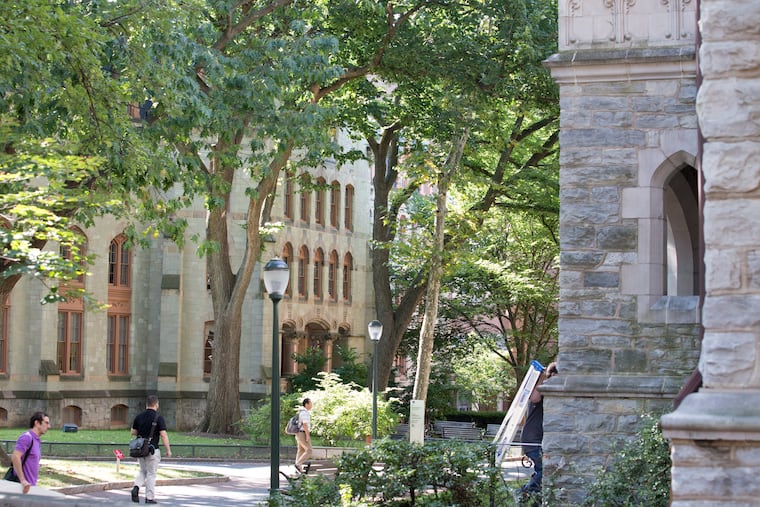Penn to require students to live on campus through sophomore year
The move is a bid to provide more support in the face of concern about student wellness and coincides with requirements at several other Ivy League schools, the university said.

In a bid to provide more support and respond to concerns about student wellness, the University of Pennsylvania, beginning with the freshman class entering in 2020, will require students to live on campus through sophomore year.
They currently are allowed to move off after freshman year.
It's not a unique move; several other Ivy League universities already require students to live on campus beyond freshman year. Some colleges, including Susquehanna University, in Selinsgrove, even require students to live on campus all four years.
"The thinking is that they will have better overall academic success if they stay on campus and that they will be more connected to the campus community and the faculty and staff on campus," said Emily Glenn, librarian for the Association of College and University Housing Officers – International.
Penn's change was recommended by two university task forces on student wellness, which outlined problems students faced when they moved off campus and barriers the college had in providing support to students once they were gone.
It also follows concerns in recent years about student suicides at Penn and questions on whether the university does enough to help troubled students. More than a dozen Penn students have died by suicide since 2013.
Calling it "The Second Year Experience," the university will offer students programming in academics and research, "social standing and community," personal finances and budgeting, and pre-professional exploration, the school said in a news release.
"Penn is dedicated to the safety and well-being of its students, faculty, and staff and has committed significant time and expert resources in evaluating the best ways to promote the academic success and personal wellness of its student body," Penn president Amy Gutmann said in a statement. "Expanding the College House system through the Second Year Experience is the single most important way we can add to our students' success at Penn and beyond."
The move, according to the Daily Pennsylvanian, the student newspaper, already has raised concerns about cost — some students feel they could find cheaper housing off campus. Some within the sorority and fraternity community also have objected, given that many Greek-life houses are filled with sophomores.
"There are large contingents of the student population who are not in favor of the policy change, especially those who are involved in Greek life," said senior Michael Krone, Undergraduate Assembly president.
But the economics and political science major from Lafayette Hill said other students likely would be in favor of some of the goals of the policy change, which are supposed to make the living experience better for students. He said students should speak up and offer their input as the university makes the change.
"The what of this decision and when are not negotiable," he said. "But the how is really up for interpretation and influence. The actual implementation is what people are concerned about but also have a lot of opportunity to engage with."
One of the task forces that recommended the change was created after an off-campus "underground" fraternity, not sanctioned by the university, in 2016 sent a sexually suggestive party invitation to freshman women. Penn announced last spring that it would take more steps to monitor behavior by the off-campus groups and require them to follow the same behavioral standards as recognized Greek organizations or their members could face discipline.
Gutmann said in the statement that the new sophomore requirement, which will take effect for the first sophomores in 2021, can be accommodated as the university finishes building two new college residences, including New College House West, which will open that year with capacity for 450 upper-class students. The university will be able to house all freshmen, sophomores, and 20 to 25 percent of juniors and seniors who want to stay on campus.
University officials declined to be interviewed.
"We believe strongly that, over time, these new programs will significantly enhance the well-being and sense of community not only of our second-year students but also of our entire campus," provost Wendell Pritchett said in a statement. "We welcome an ongoing conversation about how we can continue to make Penn a leader in sustaining the wellness of our community and the personal and academic development of our outstanding students."